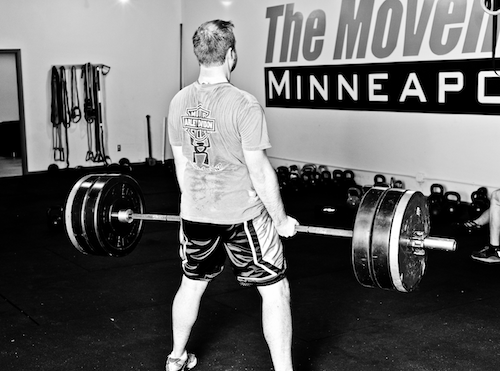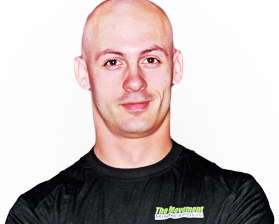
Lifting weights, like anything worth doing, requires an investment of time. Whether you’re lifting weights to lose body fat, build the physique of a bodybuilder, or hoist huge weights as a competitive strength athlete, you will have to plug the meter with some time to accomplish your goals. And, as with anything that requires time to be invested, people will always find reasons not to put their coins in the meter. Sometimes this comes down to simple, raw excuses.
There is a phrase in the fitness culture, “How you feel is a lie,” that was coined by John Broz but is often repeated by far less accomplished and experienced trainers and writers. John’s contention is that how you feel on any day is not an accurate reflection of your state, and that you should ignore it. So if you feel like crap on a training day, instead of hitting the couch, you should go to the gym, lift weights anyway, and continue making progress. John has countless stories of lifters hitting PRs on days they didn’t feel like training.
The only problem with that mantra is that how you feel is not a lie. Your body doesn’t lie to you, but it is possible you don’t know the right action to take based on what you are feeling. And that’s where things get a little more complicated. It All Comes Down To State Your state — the particular condition that someone or something is in at a specific time — affects everything you do and how you do it. In the Gym Movement course we have a phrase, which I’ve modified here slightly*: “State Before Action.
This refers to the fact that your state comes before and affects every action you take. If you go into a workout in a bad state, whether it’s because you’re under-recovered from a previous session or simply in a bad mood from an argument with your boss, the likelihood of having a good, productive workout is extremely low.
Unless something changes your state
For some people, the very act of lifting weights is the perfect action to take to resolve their state and put them in a better place. They may be physically ready for the session, but in a terrible mental state. As soon as they hook their fingers over the bar, a change takes place and puts them in exactly the right frame of mind to make progress. They may even be physically exhausted, and in need of recovery, but the act of lifting puts them in a state where they are able to perform.
Yet, for others, or the same person on a different day, going into a lifting session in a bad or unprepared state will only result in piling more unresolvable stress on top of an already overstressed system. The result is injury, illness and frustration: all common ailments plaguing people who hold the belief that their body is lying to them.
What does it cost?
Everything has a cost.
The physical exertion of a workout has a cost that can be measured in nutrients and sleep or recovery for the body to rebuild. Skipping a workout and hitting the couch for three episodes of Modern Family has a cost as well — one that is less easily measured — in the eventual onset of a back injury from weakness, and diabetes from lack of activity. Everything you do has a cost.
The cost of a workout in any kind of bad state, whether it be mental or physical (which is a false distinction anyway), is much higher than the cost of a workout in a good state. Without getting into an overly technical discussion of nervous-system states, we can say this: If you are in need of recovery because you are in a highly sympathetic state, you may very well be in a state to hit some all-time highs because your body is READY TO FIGHT, but the cost of fighting in the overly sympathetic state will be extremely high.
You will come crashing down. Your body isn’t lying: Fight if you must, but be prepared to pay the cost.  Broz and others have their stories about how people set huge PRs on days they didn’t even want to train, but of course no one remembers the awful workouts where taking a day off would have been more productive, or even more to the point, no one remembers the days of recovery required after those huge PRs under duress.
Broz and others have their stories about how people set huge PRs on days they didn’t even want to train, but of course no one remembers the awful workouts where taking a day off would have been more productive, or even more to the point, no one remembers the days of recovery required after those huge PRs under duress.
Train or Try Again Tomorrow?
I’m not giving anyone an excuse to skip a workout. That is not what listening to your body, or auto-regulating your training, is about. In fact, if you have a good understanding of what you are feeling and what the correct action is, you might know that a workout (even one that veers away from what you had originally planned) is exactly what you need to feel even better.
What I am advocating is that you gain a deeper understanding of the sensations and signals your body is giving you so that you can take the most appropriate action to make yourself better every time. To do that, you have to have an understanding and appreciation for how your state affects you, and that everything does have a cost.
*State is a foundational concept in the Gym Movement Biomechanics 1 course, and may be one of the most important things I have ever learned. Frankie Faires originally coined the phrase “State Before Skills,” but I’ve found that for most people “State Before Action” is more intuitive. If you’d like to learn more about the GM courses, shoot me an email.


I would like to learn more about the GM course
Hey Jim, you can sign up for free here: https://www.dellanave.com/free-gym-movement-ecourse/
I would not hesitate though, I don’t think I’m going to offer that ecourse for free for much longer.